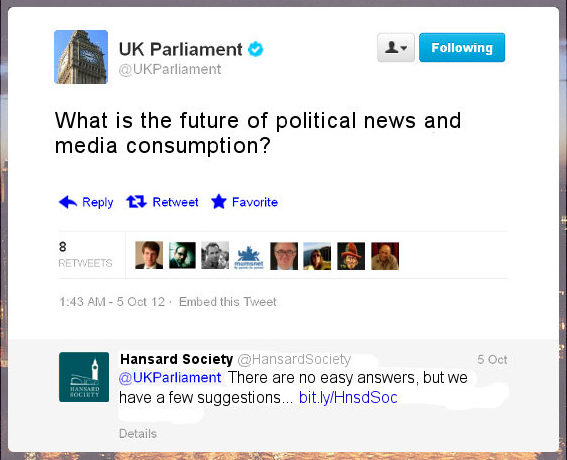#FutureNews - Techifying Parliamentary Communications

A new report published in the UK examines the role that technology plays in providing citizens access to information and events related to Parliament. The report: “#FutureNews - The Communications of Parliamentary Democracy in a Digital World,” provides an interesting look at a strategic approach of the UK to increasing the openness of White Hall. It's long been evident that technology is diversifying the media through which citizens consume news and entertainment. It's also clear that it is incumbent upon governments to keep up with citizens to maintain transparency and accountability in democratic processes. Using new technologies and media strategies, the report argues, Parliament must insert itself in to the public debate and add substantive value to the the political conversation.
Following are key findings from the report and a brief discussion on how these takeaways are applicable in the developing world from an NDI Tech4Dem perspective.
Parliamentary communications must necessarily evolve to match the needs of citizens. This does not mean that communications need be disseminated on every medium or targeted towards every device. However, the content should be of a quality and format such that it is easily packaged and reused. This packaging approach might include using XML and open APIs. It might mean making data available in other formats that are easily machine-readable and downloadable. The goal should be the expansion of the ways in which data can be used and presented. Furthermore, usability and functionality of the platforms in which news, reports, or general parliamentary data is presented are important and should take into consideration social networking dissemination of information. In the UK, for instance, more than 70% of individuals surveyed in the country were found to have accessed social networks at least once daily.
Strategically, the report also notes that there is a growing diversity of actors with a point of view - parties, politicians, functionaries, and others -- who situate themselves along a growing political spectrum. There are many stories being told by many actors - and the result can be messy. This requries a devolution of management of parliamentary messaging to support creativity and initiative that may not always be presented in a neat narrative. These multiple actors all contribute to a diverse set of information streams that should be oriented towards a quicker and more anticipatory storytelling able to provide information, graphics, and other media in a shorter time-frame.
The report also goes into detailed audience analysis. Irrespective of country it is important for parliamentary actors to have a thorough understanding of who consumes what types of content. Although this report is specifically focused on the UK it offers broader lessons for open government and democracy communications strategies in a digital world. We would argue that while not sufficient, when information is widely and accessibly made available in the public sphere, democratic processes can be improved. A focus on tailored access with an emphasis on usability and quality of content goes a long way towards enhancing consumption and subsequent participation in democratic processes. Using new technologies to communicate becomes vitally important to foster trust in institutions, democratic stability, and ultimately, democratic development in both developed and developing countries. The report concludes with a statement applicable to the consideration of technology in any context:
“Together, such a package of investment could deliver real democratic value for the future; helping to enhance public knowledge, understanding and engagement with the core institution of our representative democracy.”
